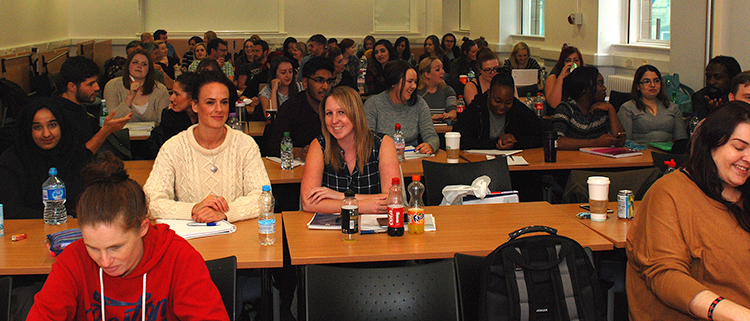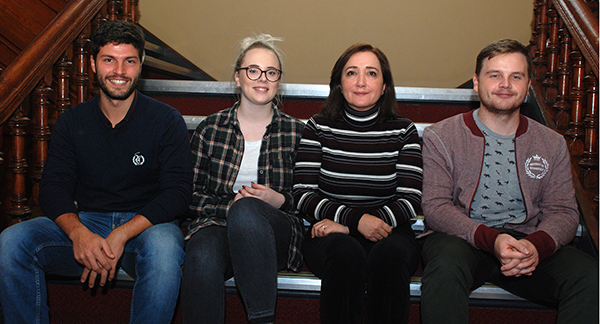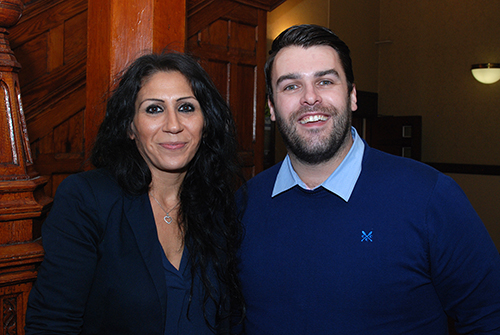The world descends on Huddersfield for Investigative Psychology
 Students flock from across the globe for the Huddersfield MSc in Investigative Psychology
Students flock from across the globe for the Huddersfield MSc in Investigative Psychology
Fri, 07 Oct 2016 09:18:00 BST
“…increasing recognition of investigative psychology as a valuable tool for solving and understanding crime and criminal behaviour…”
 ◄ Investigative Psychology students (l-r) Giovanni Compagno, Rebecca Illingworth, Tania Hussein and James Smith
◄ Investigative Psychology students (l-r) Giovanni Compagno, Rebecca Illingworth, Tania Hussein and James Smith
INVESTIGATIVE PSYCHOLOGY is now a discipline that is recognised internationally as a valuable tool for solving and understanding crime and criminal behaviour – and increasing numbers of people from around the world are coming to study the subject at the University of Huddersfield.
Its pioneering Master’s course in Investigative Psychology is a blended-learning programme, accredited by the British Psychological Society that combines web-based study with attendance at a series of intensive weeks at the University itself. The 65-strong cohort enrolled for the 2016-17 course is the largest yet and its launch week was attended by students from the UK and overseas, including the Middle East, New Zealand, America, South Korea and Continental Europe.
Some of the students are yet to embark on their careers, but some are already seasoned professionals who realise that an MSc in Investigative Psychology will boost their skills. They include DC Steve Filkin, of Liverpool CID, an experienced detective who believes the course will make him better at the job.
“Although we see everything at a crime scene, we don’t necessarily interpret what we see so we miss a lot,” said Steve. “It will be really beneficial to be able go there with a different mindset and put together things usually only left to forensics.”
One of the overseas students on the MSc is Tania Hussein of Jordan, who works as a consultant in child protection. She aims to employ investigative psychology in her work with juvenile delinquents, improving the investigative and interview process with the police.
 ► Lead tutors Dr Maria Ioannou and Dr John Synnott
► Lead tutors Dr Maria Ioannou and Dr John Synnott
“I am also interested in designing prevention programmes for juvenile delinquents, so that you are able to predict recidivism,” she said, but added that new ideas she had already encountered on the MSc course might shift her work into other areas.
The overseas cohort also includes New Zealander James Smith, from Auckland, a graduate in criminology and psychology who aims for a career in police or forensic work. Giovanni Compagno, from Italy, is a psychology graduate who already works with victims of stalking and bullying.
“I have learned a lot of interesting things over the week here, and I really appreciate the atmosphere,” he said.
Naturally, the course also attracts a heavy UK contingent, including University of Huddersfield graduates who developed an interest in investigative psychology during their Bachelor’s degree studies.
An example is 21-year-old Rebecca Illingworth, of Halifax. During her psychology degree at Huddersfield she took a module on the investigative branch of the discipline and her fascination for the subject led her to enrol for the Master’s. She hopes that the qualification will aid her ambition to work in prison or with offenders.
 “The numbers that we have here are selected from over 250 students who apply to do the course, the blended nature of the course opens it up to a lot of people to come and study,” said Dr John Synnott, Senior Lecturer and Assistant Director of the course.
“The numbers that we have here are selected from over 250 students who apply to do the course, the blended nature of the course opens it up to a lot of people to come and study,” said Dr John Synnott, Senior Lecturer and Assistant Director of the course.
“The course has been a remarkable success evidenced in the fact that we already have 50 applications and enquiries for the course for the next academic year,” added Dr Maria Ioannou, who is a Reader in Investigative and Forensic Psychology and the Course Director.
The University of Huddersfield is the current academic home of Professor David Canter (pictured left), who coined the term “Investigative Psychology” and developed the discipline in the 1990s. During the study week he gave the students a two-hour introduction to the subject.
Lecturers and researchers then covered a wide variety of topics. For example, Dr Maria Ioannou – the Course Director – led a session dealing with Violent and Sexual crime. Assistant Director Dr John Synnott covered the subject of Acquisitive Crime and Tiger Kidnap (a form of Armed Robbery). The final session of the week was a profiling workshop where students were able to work on real case information.
- More information about the course can be obtained online.







